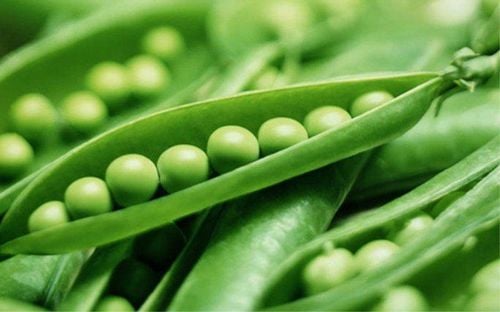1. Types of white beans
The most commonly used white bean is the Cannellini bean, but there are other types of white beans, such as:
- Navy beans, also known as pea beans, are small and oval-shaped. They have a milder flavor than other white beans and are often used in certain soups.
- Great Northern beans are smaller than Cannellini beans but larger than Navy beans. Known for their delicate and appealing flavor, they are often added to stews and soups.
- Lima beans, also called butter beans, contain both starch and fat. Like other white beans, they are a common ingredient in casseroles, soups, and other stews.
Since all white beans have a similar flavor, they can be used interchangeably in recipes.

2. Nutritional content in white beans
White beans are nutrient-dense foods, rich in fiber and protein. They are also an excellent source of micronutrients, including folate, magnesium, and vitamin B6.
One cup (170 grams) of cooked white beans provides the following nutritional values:
- Calories: 242
- Protein: 17 grams
- Fat: 0.6 grams
- Carbs: 44 grams
- Fiber: 11 grams
- Copper: 55% of the Daily Value (DV)
- Folate: 36% of the DV
- Iron: 36% of the DV
- Potassium: 21% of the DV
- Thiamine: 17% of the DV
- Phosphorus: 28% of the DV
- Magnesium: 26% of the DV
- Zinc: 22% of the DV
- Calcium: 16% of the DV
- Vitamin B6: 12% of the DV
- Riboflavin: 6% of the DV
- Selenium: 4% of the DV
White beans are highly beneficial for health. They are very low in fat, contain no cholesterol, and have the same amount of calcium as a glass of milk. Additionally, they include several essential nutrients, such as:
- Lysine, an essential amino acid
- Polyphenols, powerful antioxidants
- Resistant starch, along with a high fiber content, which helps maintain low blood sugar levels
As seen, white beans are particularly rich in copper, folate, and iron.
Copper mainly supports energy production and iron metabolism, while folate is used in DNA synthesis. Iron plays many critical roles, including producing hemoglobin and transporting oxygen throughout your body.
Moreover, white beans are high in polyphenol antioxidants, which combat oxidative stress in the body. This may help protect against chronic diseases, including cardiovascular disease and certain types of cancer.
3. Health benefits of white beans
White beans are very good for health and offer various benefits due to their rich nutritional content. Below are some of the health benefits of white beans:
Supplementing the body with protein
White beans are an abundant source of protein. When combined with a proper exercise regimen and a nutritious diet, they can promote healthy muscle mass.
Amino acids, the building blocks of protein, play a key role in many bodily processes, including muscle building, nutrient transport, and hormone production.
The Institute of Medicine indicates that consuming at least 0.36 grams of protein per pound of body weight (0.8 grams per kg) daily is associated with maintaining healthy muscle mass. This equals 54 grams of protein for a person weighing 150 pounds (68 kg).
Beans, including white beans, can serve as one of the primary protein sources for those following vegetarian or vegan diets.
However, white beans are not a complete protein source, meaning they do not contain all nine essential amino acids your body needs. Therefore, it is recommended to pair white beans with grains like rice, barley, corn, and wheat in meals to provide the missing essential amino acids. The combination of beans and grains, such as beans and rice, is often referred to as complementary proteins.
Rich in Dietary Fiber
According to the Institute of Medicine, women should consume at least 25 grams of fiber daily, while men should consume 38 grams. A cup of white beans (170 grams) contains up to 11 grams of fiber—nearly half of the daily requirement for women and about one-third for men.
A high-fiber diet has been associated with improved digestive health and may promote regular bowel movements by increasing stool bulk and reducing the time between bowel movements.
In addition, white beans contain resistant starch, which is fermented in the colon to produce beneficial compounds called short-chain fatty acids (SCFAs). These SCFAs nourish colon cells and play essential roles in carbohydrate, fat, energy, and certain vitamin metabolism.
Finally, a high-fiber diet can enhance cardiovascular health by reducing LDL (bad) cholesterol levels.
Aiding in Weight Loss
White beans are nutrient-dense yet relatively low in calories. Combined with their high fiber and protein content, these qualities can support a healthy body weight. Fiber- and protein-rich foods have been shown to promote a sense of fullness, leading to reduced food intake.
Additionally, protein-rich foods are linked to lower levels of ghrelin, a hormone that induces hunger. Over time, consuming protein-rich foods can naturally lead to reduced calorie intake. Long-term studies show that people who regularly consume beans have a 22% lower risk of obesity and 23% less excess abdominal fat compared to those who do not eat beans.
Some studies also suggest that white beans provide additional health advantages, including:
- Fighting Type 2 diabetes
- Improving and managing blood sugar and lipid levels in people with diabetes
- Lowering blood pressure and cholesterol levels

4. How to Prepare White Beans
Beans contain carbohydrates known as galacto-oligosaccharides (GOS), which can cause gas. Soaking and rinsing dry beans before cooking helps eliminate most of these compounds. Rinse the beans and store them in a container. Start with small amounts to help your body adapt to this high-fiber food.
Raw beans are considered a legume that contains a type of protein that may cause digestive issues. Even small amounts of raw or undercooked beans can lead to stomach discomfort, nausea, diarrhea, and bloating. They may also interfere with the absorption of essential minerals. You can neutralize the natural compounds in legumes, including white beans, by cooking them thoroughly or soaking them in water for several hours before preparation.
Store beans in sealed containers and avoid exposing them to sunlight. Keep them in a dry, cool place. Thanks to their mild flavor, white beans can be used flexibly in various dishes, including stews, soups, chilis, and casseroles. Both dry and canned white beans can be used.
If using dry beans, soak them in water for 6 to 8 hours before cooking. A quicker alternative is to boil them for 2 minutes, cover them, and let them sit for 1 hour. Soaking softens the beans and reduces the potential side effects of consumption, such as gas and bloating.
Be aware that canned white beans may contain added salt, so check product labels—or look for low-sodium or salt-free options. You can also reduce their sodium content by rinsing them before use.
Vinmec International Hospital, with its modern facilities and equipment along with a team of experienced specialists and doctors, ensures patients can confidently receive examinations and treatment at the hospital.
To arrange an appointment, please call HOTLINE or make your reservation directly HERE. You may also download the MyVinmec app to schedule appointments faster and manage your reservations more conveniently.








